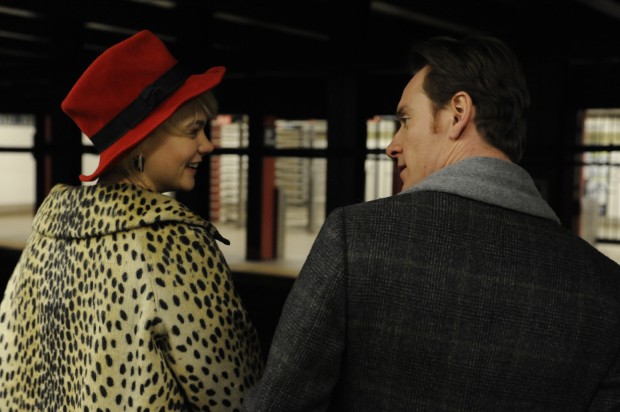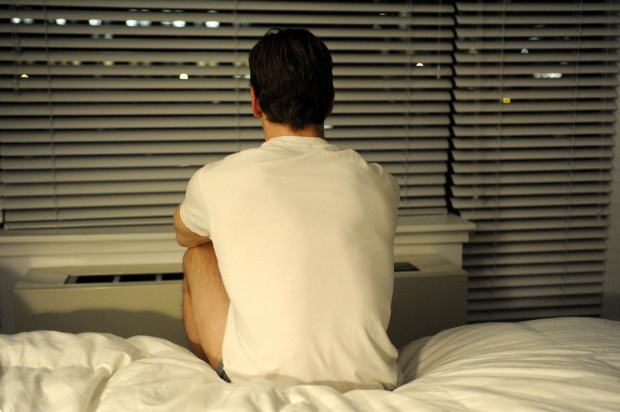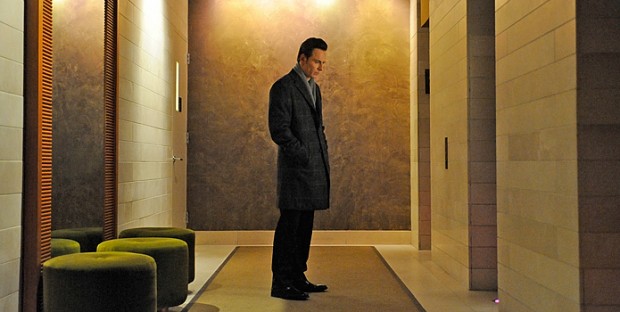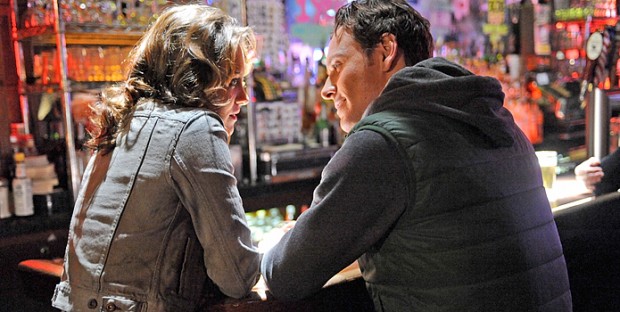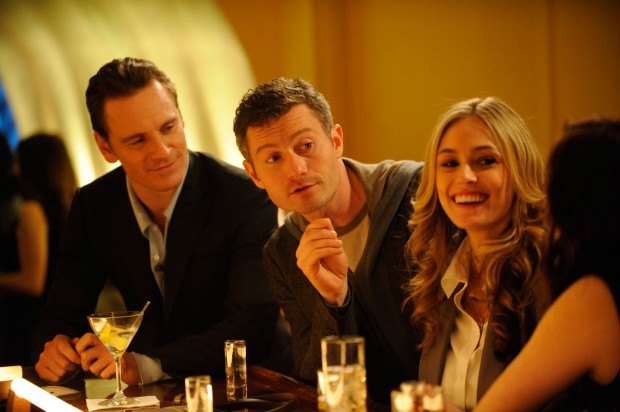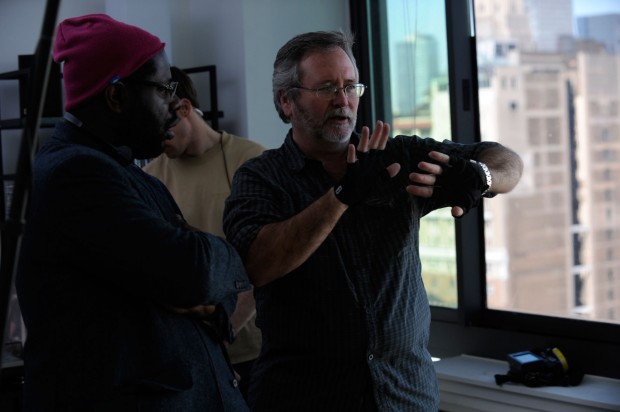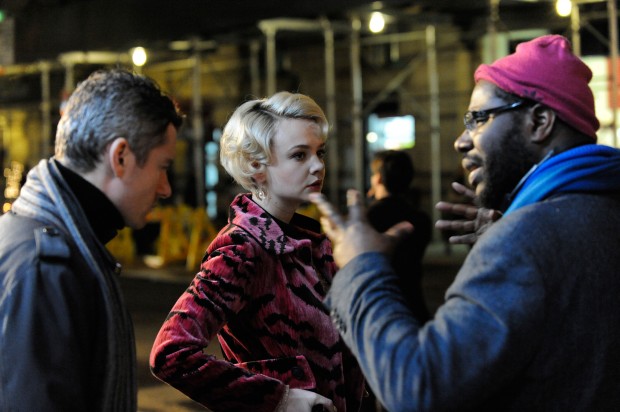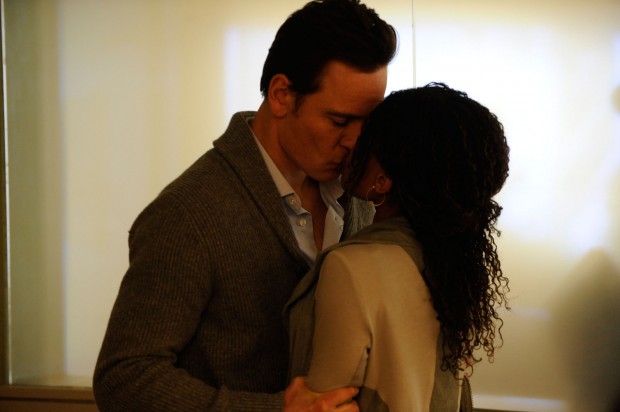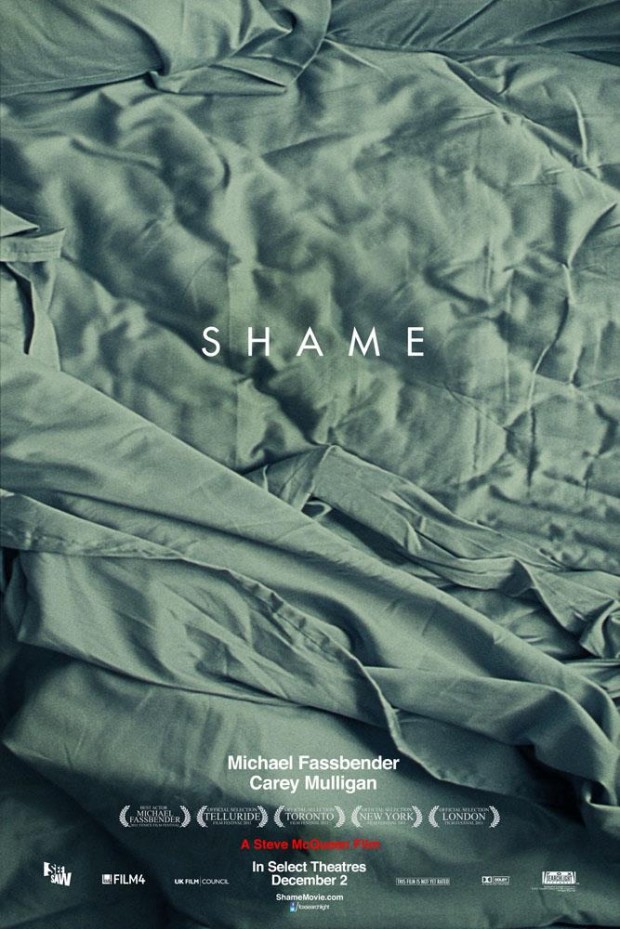Director Steve McQueen has made a name for himself and front and center in his two feature films is Michael Fassbender. The duo work together in a synergistic way, pushing and pulling each other to new heights. As an audience, we benefit, and their latest film, Shame, is no different. A haunting glimpse into the world of sex addiction, the narrative follows Brandon (Fassbender), a seemingly well put-together man with a beautiful apartment, prosperous job, all in the heart of New York City.
Rated NC-17, the film is a visual feast but also disturbing in how ordinary Brandon looks and how distant and pleasureless the depictions of sex are. This is a film worthy of discussion and one that will likely stick with you. Last month, I participated in a roundtable interview with Fassbender and McQueen and the results were incredibly informative. I cannot recommend the film enough, and encourage anyone to check out our discussion. One warning: Because of the nature of the film and the ability to delve into it with the artists that created it, we did not hold back and at times it can get very spoiler heavy. I have marked the latter section as such.
The Film Stage: You guys definitely win the award for most uplifting movie of the year.
Michael Fassbender: That’s what we were hoping for!
Michael, you’ve done a bunch of mainstream films recently that have put you on the fast track to being a huge mega-star, so doing a film like this is a real ballsy thing.
Fassbender: Excuse the pun…
[Everyone laughs]
Was there ever any hesitation?
Fassbender: Never. You know, I’m in the business of storytelling. I’m there to facilitate a story, and whether that story involves mutants or real-life people, the sort of respect I bring to it doesn’t really vary. And in terms of me thinking, it’s exactly what I don’t think. I don’t think ‘is this going to damage Michael Fassbender?’ I’m thinking about my job as an actor. It’s not to sort of worry how an image is portrayed or anything like that. It’s ‘How do I facilitate the story?’
Now would I have done this film if it had been in anybody else’s hands? I don’t know. I knew I was going to be in the best hands possible and the trust between us is really beyond a hundred percent. So it’s really just about ‘Am I going to hold up my end of the bargain?’ and that’s really where the nerves come in, and the fear. It’s like ‘Am I going to be able to represent Brandon the correct way? Am I going to be able to bring to the table something that is going to help Steve and Abi [Morgan, co-writer]?’ They’ve written this beautiful story and my part is to facilitate it in my area. All the other stuff is just distraction, and you just keep it really simple.
Steve McQueen: Just to jump on that. There are always actors around. But Michael is an artist. What I mean by that is he’s looking for something to facilitate that—as all artists are. So it may be high and it may be low, but where the goal is you’ll go. Oh that was a rhyme wasn’t it? [Laughs]
What do you make of all the attention towards you personally?
Fassbender: Eh, well you know. I mean, really nothing changes. Obviously you’re doing circuits like this and going to festivals. It’s exciting and it’s nice. But my day-to-day routines and activities haven’t changed at all. And whatever has happened in the last five years…
Well, what has changed and what is amazing is the choice. You know? You have filmmakers who are interested in working with me that I hold in high regard, who are very talented people. So that is the pinnacle. That’s the dream. At one point you’re just happy to be a jobbing actor, that’s good enough. So to be in this position, it’s like the one percentile. It’s crazy
Steve, can you talk a little bit about getting the project off the ground? What the origin of it was?
McQueen: Well, it kind of started in fact with a conversation I had with Michael in 2008. Just previously before that I had seen this Pasolini movie… I can’t remember the title of the film, but I had read about this Pasolini movie where his character slept with the whole entire family. He was this visitor who came to the house and slept with the mother, the father, the sister, and the brother. It was interesting in that whole idea of having intimacy or sex with this guy who just had sex with these people. So I put it away. Talked to Michael about an idea that was very vague because it wasn’t really an idea. Fast forward two and a half years later and I had a conversation with Abi Morgan and within that conversation we started to talk about the Internet and pornography and we got onto the idea of sex addiction. I thought ‘This is it!’ Alarm bells went off in my head. I thought ‘This is the subject. This is what I want to investigate.’ And from there we tried to actually interview people in London to help us find out more about it because that’s what we were interested in. It was almost like Miss Marple and Colombo.
[Everyone laughs]
Two sort of fumbling detectives on the trail of sex addiction. Unfortunately, we came across a dead end because no one at that time wanted to speak to us. It’s kind of strange because at that time in the media it was very much in the public eye, sex addiction. And what it did was it closed a lot of doors so no one wanted to speak to us. It was very, very difficult. So then I said ‘I need to talk to experts in the field.’ And so I needed to talk to experts in the field and the two experts we found, the ones who were pretty highly regarded, were in New York. We went over there. We had conversations with them and they in turn introduced us to sex addicts and people who were suffering with the affliction and people who were recovering. And that was the sort of seed and that was it. And I thought ‘Okay, let’s shoot this in New York.’ And that was it.
In the film, Brandon is very well put together. He’s got an immaculate apartment, he’s got an immaculate look, he’s got a great job. From the outside, he looks like everything is together. And on the inside, obviously he’s breaking. Was that your experience with your research, where these people had that facade?
McQueen: I think most people with addictions are pretty… I mean most of them could get into the CIA, meaning that there’s a situation where they hide it even from themselves. ‘I don’t have a problem!’ And if they do have a problem, they’re very careful about hiding their tracks. It’s just one of those things that comes along with being involved in addiction in general. Yes, Brandon is this person who has everything in a way but within that he is putting himself into prison by his actions. He can’t help it.
And, again, sex addiction is not about being promiscuous… a lot of people are promiscuous. This is about an all encompassing. This is a situation where the addiction dictates the person… it controls the person. So it becomes a certain situation where the habit or the person that has this affliction has no choice. He has to facilitate the addiction.
It’s a very raw yet beautiful film and I think it took a lot of courage to bring it to the screen. Due to the heavy subject matter, it probably received a lot of resistance from day one. Were you prepared, no matter what, to make this film?
McQueen: It was kind of easy. There was no problem at all. Everyone talks about NC-17 and was it easy or was it difficult? Actually, it was like ‘I want to make this film’ and everyone way very helpful and supportive and it got made. Maybe I shouldn’t say that actually… It was terrible! It was hard!
Fassbender: Also, like the film coming out through Fox Searchlight… you realize there’s really passionate, intelligent people that enjoy films that are challenging. And this sort of idea that’s being portrayed, that Americans are not comfortable going into those sort of scenarios, that’s just absolute bull shit. You know, the ‘70s movies that came out of this country that really inspired me to start doing this were all about that. Films where people would actually have conversations days later about it.
McQueen: Provocative and challenging movies. And I imagine a majority of the people in the movie business now came out of that era of seeing movies like that. And I think that’s why we’re fortunately enough getting a lot of attention, because I think it reminds people of those times.
Is the European version of NC-17 seen as much of a ‘mark of death’ as it is in America?
Fassbender: Well, it’s 18 in Europe, isn’t it?
McQueen: Yeah, but it doesn’t mean anything. It’s 18, it’s 19, they’re very loose with that. You can advertise on TV, you can advertise wherever you want. There’s no censorship with it.
How soon did you know the film was going to be rated NC-17?
McQueen: I didn’t know what NC-17 was before this! I thought it was a rap group! I thought someone was going to give me a CD… ‘I love it! Thank you very much.’
[Everyone laughs]
McQueen: In all seriousness, we’re artists and what I mean by that is we’re trying to make something that portrays reality. Sometimes we don’t necessarily want to see what reality looks like. We want to turn away from ourselves. And often people put their heads in the sand like an ostrich. I think what the cinema screen is in some ways is a place that we can actually see ourselves and have an idea or gauge ourselves in someways of where we are and how we’ve got to go. In one way, shape, form or the other.
So, what you’re saying is, as filmmakers, you don’t really care as much as the people who sit around and worry about these things?
Fassbender: Well, it’s job descriptions, isn’t it? I mean, you guys do your job… I can’t do your job, which is sort of represent an impression of what you see. My job is to go in and act.
McQueen: We don’t go into the situation without responsibility… this is a responsible film. This is a very responsible film so it’s not to say that we don’t care in any way. Because I wouldn’t necessarily do a horror movie where people get chopped up in several pieces and put in a frying pan. I find that very irresponsible filmmaking but apparently that doesn’t get an NC-17 rating.
Fassbender: It’s more normal than a penis on screen!
McQueen: And if I’d made this film set in 1951 he’d be walking around in his pajamas. But he’s in the privacy of his own apartment and a lot of people these days don’t wear pajamas. So it’s just normal. There’s no shock. Two clicks on your iPhone and you can see the most explicit pornography you can think of so it’s just ridiculous. But that’s how it is.
It says a lot about our culture too that we’re more concerned with that than the other.
McQueen: For me, I understand why they did it. All I care about is that people are allowed to see the film. If that’s the rules, fine. I respect the rules. But as long as it doesn’t prevent people from going to see it, that’s all.
You two have worked together twice now and are set to work together again. What is it about each other that allows you to work so well together?
Fassbender: I think trust. It all goes around trust really.
McQueen: Absolutely. Absolute trust. I’m just so grateful to have a situation where I’m working with someone. It is a dream come true in a way, you’re working, you’re collaborating with someone. You’re pushing each other and you’re sort of challenging each other and it’s coming off. It’s wonderful. I was a bit naive. I thought every actor was like Michael. But no, they’re not. He’s exceptional. And I think within the work, he just transforms and transcends in some ways the character. He can actually embed himself in Brandon Sullivan and then come out, have a cigarette, and start talking to Hair and Make-Up. He has that chameleon sort of thing. And it’s not put on, it’s not false. He’s a hard working actor in the real sense. I don’t think he’ll ever be that certain type of Hollywood actor because he’s just too good, meaning that he could possibly be in big movies but he is just amazing. I’m going on, I’m sorry. You’re here!
Fassbender: I’m right here! [Laughs]
McQueen: There is a quality to him which is just incredible. I believe him. He’s a man’s man to an extent but there’s a femininity in him, there’s a fragility in him which he shows. Meaning that I can see myself in him and other people can see themselves in him. He’s not just this macho guy. There’s a beautifulness to him, a femininity to him, that can actually allow you to involve yourself or invest yourself with him. So that for me is a huge plus because the audience are very much sort of led to embrace him.
Fassbender: But it all comes down to the sort of environment you create as well. And I think the first thing that sort of struck me when I met Steve is this idea that he’s a very honest person and open. So it’s alright to be vulnerable and it’s alright to be insecure, or feminine, or nerdish. All the things that we, perhaps, try and sort of disguise because we’re afraid of ridicule or whatever it is. Not being accepted. These are all things that I think we can all relate to and Steve is very much an open book. But that’s with the entire crew. When we were working in Belfast on Hunger, I thought, ‘OK, wow.’ I come to work and you see the passion on the art department’s face or any department you like. And I was like, ‘Wow, this is pretty palpable and powerful stuff.’ But then, of course, we were dealing with the topic matter that was very personal to people that were working on it.
So when we went to New York I was curious to see, and exactly the same thing happened on that set. And you’re talking about people that have been working in the business for 30 years. I remember Joe the grip was saying to me, ‘I don’t want to let Sean [Bobbitt] or Steve down.’ And he’s been in the business for 35 years and believe you me, he’s not getting paid a lot of money to do Shame. But it’s that passion because Steve’s a very inclusive person. Everybody believes… right down to catering that they’re part of something together. So then you have a force that’s collectively really, really effective and powerful and we work fast.
Michael, when you first read the script, what jumped out at you about this character?
Fassbender: I fell for him, you know? I felt I really liked him. I thought it was a beautiful insight into something I didn’t have really any knowledge about. At the beginning, you say ‘Sex addiction’ and you’re thinking, ‘Oh, yeah.’ Do you take it seriously? I didn’t, really. And then you start to investigate and then you start to meet people and you realize just how devastating and real it is. The thing that struck me was how Abi [Morgan] and Steve had created these characters that I really cared about, and I thought it was beautiful and thoughtful. Like we said before, I’d already sort of committed. I was willing to do it anyway without the need to see a script just because I know Steve is going to be on the ball there. It’s going to be dealt with in the most respectful way. In a lot of ways, uncompromising in the right places.
Brandon’s a character whose life really depends on the secrets that he keeps. What did you learn about yourself while you were kind of playing that character?
Fassbender: I learned that I feel lucky, I suppose. That I have a healthy relationship to sex. And also just relationships in general. I supposed I’m a pretty open person and I enjoy the sort of intimacy of relationships. And I feel very blessed. Whether that’s down to the family that I grew up with, my parents and my sister. They’ve given me an awful lot of grounding and that sort of nurturing. I experienced it. And Brandon’s sort of… phew. I mean it’s dark. It was very sort of exhausting. This job was definitely the hardest because you have somebody who doesn’t like himself in a very deep way and then goes about sort of abusing himself because of it. So that’s what you take from it. You feel lucky.
Steve, I think you have a wonderful eye for detail and in the movie, a lot is done with very little dialog. A lot like Hunger and your frame’s shot wonderfully even though they’re tragic, they look like visual poetry. So was it the intent to convey everything with just the imagery and hold back on the dialog in the screenplay?
McQueen: To some extent. I think you know… most of the time, in life, I don’t think we actually use language to sort of tell each other truths. Often I think we use language to sort of fill time. A void. Or just to sort of… ‘I want. I need.’ In that way. I wanted to be honest and truthful to this character within a reality of now. Meaning that in movies, often people talk about their history and their past. Where they’ve come from, how old they are, and so forth. And in reality that just never happens. I like the idea that the audience is introduced to Brandon as you are introduced to me or as I am introduced to you now. We don’t know each other. But during the course of an hour and a half, we get to know a little bit about your past, but within the present. Of course, that takes extraordinary actors to convey that. It takes an extraordinary cameraman.
Sean Bobbitt should get credit, too. Myself and Sean just talked about ritual. We talk about how someone gets up in the morning and wipes sleep out of their eye. They’re sitting there, lying for five minutes, and then they go to the bathroom. They take a shower. They go to the subway; they go to work. The simple sort of movements like that can say a lot. Because also, the first eight minutes of the movie is about motion; it’s about there’s an arrow that just says go. He lies in bed, and then the whole thing’s moving. The train’s moving; he’s moving; the music’s on some sort of trajectory. We get to know Brandon and what he does in those eight and a half minutes. The prostitute, and then the woman on the train, and work.
In the first eight and a half minutes we get everything, and this is all virtually shown. I think we get a wonderful situation as an audience when we can be an observer. But at the same time being [enriched] by the information you’re taking on board. You have an understanding of it because audiences are not stupid. A lot of the time, as an audience member myself, I’m sitting in the cinema and it’s almost like the filmmakers are treating us like idiots. Telling us this. Telling us that. When actually we can see and hear. And we can bring our history and our knowledge into the cinema and have an understanding of what’s going on. That’s what I want to have in the film. A relationship with the audience which was set in reality. If that makes any sense.
You hit a lot of points throughout this conversation because this was a brilliant film. Brilliantly made, and just every aspect of it. What would you say to new filmmakers who are trying to find that balance of being true to what they want–the story they want to tell–but still making a marketable product. Is there a balance or is it to each individual filmmaker to know what that is?
McQueen: I don’t know what a marketable product is. I have no idea. I really don’t. I’m not trying to be funny. I have no idea. This is not a genre movie, in the sense of it’s not a comic movie or a gangster movie. I think genres are marketable, yes? I think.
So, it’s not that. So… I have no idea, what that is. I just try to do the best I can with the story. The story fascinates me. I want to tell the story. If it’s marketable or not, I don’t know. Hopefully. Possibly. I don’t know. A few people get paid from it. But that’s the last thing from my mind. I think if I was thinking about making money I would be on Wall Street, wouldn’t I?
[Everyone laughs]
Fassbender: You know, I think, if I can sort of jump in there, this reinforces one’s belief. Because at the beginning this seemed important. Seemed relevant. And you feel passionate about something. But you have no idea if others are. But you believe in something and you wanna make it. And then you let go of it and see how people sort of respond. But I think this business, even when we see how it’s all sort of developed over, like, whatever, 30 years, 40 years. Whatever you want to call it. And it’s that people see things, they go ‘Wow. We made money out of this film. So let’s take that formula and put it into this one.’ But the fact of the matter is there are no rules in this game. And I think we’ve learned that with films like Jaws where they thought it was a disaster. The fact that the shark didn’t work was what made the film because they couldn’t show the shark.
So it’s about thinking on your feet and moving, and believing in something, and then just doing it. And that’s what I think we were talking about before. Who am I to tell, ‘Oh, an audience is not ready to see that.’ Or, ‘An audience is ready to see this.’ It’s too arrogant because people are strange. What happens in a year can affect the film. Things that are happening in the present. And that sort of happens to time in well with the film. There’s too many variables in play to try and sit down and go, ‘Let’s try and make a marketable formula.’ And there’s plenty of people doing it. But do they even work? It’s like, how much money do you then have to spend to market something in order to sell it?
McQueen: I know what you’re saying, in a way. It’s kind of obvious to a certain extent. But at the same time, it’s a situation where I think people are hungry for something else. How often do you see something else that is actually sort of different and be rewarding?
Fassbender: And you said yourself, after an interview on Hunger that sort of stuck with me. It’s like, in the art world, filmmaking is a baby. It’s only been around for…
McQueen: Yes!
Fassbender: Under a hundred years. So the opportunities to go wherever are sort of there.
McQueen: Absolutely.
What do you want people to take away from your movie?
McQueen: Popcorn.
[Everyone laughs]
McQueen: I don’t dictate or what people should feel or think after they see the movie. I’m just happy that they buy a ticket and go, really.
*SPOILERS BEGIN*
I thought what was really impressive in this film was your use of long running shots. Where you’d have long periods of time of guys having conversations, and I wanted to talk to you Steve first about the logistics of shooting something like that when you had those long running shots? And Michael, what’s it like from an acting stand point having the camera running that long without any cuts?
McQueen: For me it’s about what the scene needs. I’m not putting any kind of frame work on the situation. For example, when Marianne and Brandon attempt to make love in the hotel room, it’s a situation where we have to see Brandon sort of attempt to have contact and communication with a woman which is all about sharing and giving. And I think for me it’s the most erotic moment in the movie because it’s love-making, it’s communicating; it’s all about give-and-take. Whereas from what we’ve seen of Brandon up to that point is very much ‘taking’ because of the addiction, of the affliction.
So we stayed with the characters in that situation because it’s all about Brandon trying to attempt to humanize himself and attempt to be intimate with another human being. So when that collapses it’s tragic and we stay with it. And that’s kind of the point of having that long take, that we stay within the moment there. And there’s a possibility there, but when it collapses it becomes very tragic.
Fassbender: For me it’s just really about doing the scene until Steve says cut. And whether that’s three minutes long or 10 minutes long it doesn’t really matter. I work with the script producers, intimately for a long time and I read over it for a really, really long time so I get to know the character. It doesn’t really concern me how much of the scene we’re going to do without cutting it. I’m just trying to do my part which is to live in this guy’s shoes and represent him. I guess with the long takes you have the joy of exploring [the world] and I think what I like about it more so than it being a personal thing is the atmosphere it creates in the room. Because it’s not about just the actors having to be on point and on their game for that length of time, it’s everyone. It’s the camera, sound department, and that energy just collects in the room. And the light box just soaks it up. It conveys itself onto the screen and that’s what I find interesting about it and that energy and focus.
You show his spiral and, in the end, Brandon accepts that he has this addiction but Brandon doesn’t really seek help…
Fassbender: We don’t know that.
McQueen: Yeah, we have no idea.
Fassbender: We see him later on the train after time has passed and you don’t know what’s happened in that period of time.
McQueen: Life is much more complicated than happy endings. And we hope to have a happy ending, absolutely, but it’s just one of those things where he has to find it in himself or how he’s going to do it, I don’t know. Does he stay on the train? Does he get off the train? We don’t know. And what Michael says quite well, as an audience we go into the movie in a way as if the movie has already been playing and when we leave the movie, it will continue to play. So we don’t know. It’s difficult. It’s just difficult.
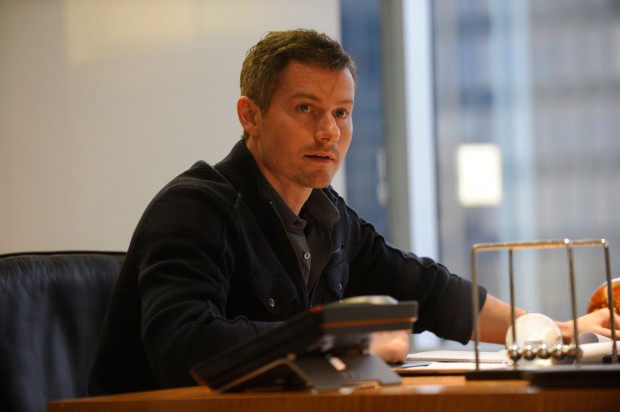
One thing that I was impressed with watching the film was that [this film can’t] translate to any other medium. It really plays in the medium of film.
McQueen: Well, I’m not too sure about that. I think you can go back and write a very good book on Brandon’s existence in New York. I think you could very much write a good book on that because it’s all about now. But I think what was interesting with me having the opportunity to make the film, and yes, there are hardly any books on the subject matter as far as I am aware. Fiction novels on it. But what was interesting for me as far as writing it was the investigation. The actual finding of things. I didn’t know where we were going. I always use an analogy, but it was like being in a room with the lights off, feeling our way around. Sort of like, ‘What’s this?’ Bump my hands on something. ‘Oh my God. Really?’ We were finding things out as we went along.
So what I meant by that was that in the screenplay, it was one of those situations where it was a lot of description, yes, and dialog. But at the same time there were things I discovered while shooting. A lot of things you discover while shooting. I think the script is a guide. But it has to be a damn good guide because you have to present it to great actors and if they say, ‘What’s this?’ So it has to be a damn good guide. But you can also leave the page. You have to find it. So yea, sometimes we were like, ‘OK, it can be one description but we have to find it in the room.’ I’m sorry. I hope that answered your question.
Steve mentioned earlier that you were filming a scene with Brandon’s character and Marianne and how he seems to fall apart in a moment where he presents more emotional vulnerability with Marianne. Or even offering a hand or an arm for his sister to hug. He seems to recoil from that. I noticed that in all of Brandon’s sexual encounters, he actually engages in open-mouth kissing. Which is one of the most intimate acts that can happen between two people.
Fassbender: For you.
Yea. I was wondering, for you, was that a conscious decision to parlay that into that character?
Fassbender: I think he’s a very physical person. And obviously that’s evident in how he goes about things. It’s about sort of devouring something. It’s about taking it. Now, what you do with that and the sort of investment that you bring. The sort of investment that you bring to kissing is different to what Brandon has. It’s whatever tips over into real emotional content that he can’t handle. So it’s like his sister is close to him. I mean, they’re brother and sister, so there’s an emotional relationship there that is grounded over years and years and years. So, when she’s hugging him, he knows that she’s wanting something from him. And she’s investing her emotional content on him. Whether it’s somebody investing their emotional content on him or him having to open up his to invest in them, either way it’s a no-go situation for him. And that’s the same with Marianne. He really wants to be with Marianne. He yearns for that kind of relationship.
And that’s why there’s so much nerves whether he’s actually going to go to meet her at the date is the one thing to begin with. And then he manages to go in there and sit down. And then on the stroll back he lets his guard down for that brief stroll. You get an insight into the possibility there of a relationship and I think that’s the tragedy. There’s warmth. There’s a childlike element to him. And then to take it to the next level is just way too much. That’s why, you know, talking about filming scenes and long scenes in one take, I think that was the important thing in the hotel room. To see the struggle. To see exactly where the crux of this problem is coming from.
McQueen: There’s no rulebook to sex. What you can’t do and what you shouldn’t do. There’s no rulebooks. I mean, this thing is dictating to him what it wants. And if it’s kissing or oral sex or whatever kind of sex. I mean, it is an addiction. It’s all encompassing. There’s no rulebook. It is what it is.
I’d like to talk about just the implications of the ending. Having a film center around a sex addict is not something that most people going to the theater would be able to identify with and that’s a great thing about this.
McQueen: I’m not so sure.
Well, elements. I think that’s the great thing about this film is that it allows you just being an audience member, you’re naturally put in the shoes of the main character. And you are able to see this world and realize how much you really do, in your own addictions or problems, connect with this person. You see at the end, he either reaches nirvana or reaches rock bottom. When you go into the club, I think there’s a lot of debate of whether that’s part of his background. Whether he’s a bisexual character, or whether he’s just…
McQueen: I mean, it’s sex. There’s no rules for sex. He attempts to get this girl in a bar, and he gets beat-up by the boyfriend. He attempts to go into a club to get sex. By coincidence there’s a gay club across from the bar. By that time, it’s sex.
Fassbender: It’s like why do drug addicts buy dodgy drugs on the street? And inject it into their veins. God only knows what’s going in there. But it’s like, ‘Where’s it available? Where can I get it?’ This happens to be available.
McQueen: And this happens an awful lot. This is all from research. It’s sex. They just want to get off. It happens a lot. If they can’t get into the club looking disheveled like Brandon; he couldn’t get in. Someplace will take him, that’s it. You can get your rocks off over there.
And also just to answer your other question about people… I think people are much more distant from a person that is an alcoholic or a drug addict. Because a majority of us have had sex or seen the opposite sex or the same sex naked.
Fassbender: Like food.
McQueen: Exactly. It’s as close to us as you can possibly think of. With drugs and alcohol, you give it up. But with sex, it’s another thing. You have to negotiate.
Fassbender: You meet recovering addicts. They’re in relationships. And then you have to sort of navigate that. You have to make sure you can keep an eye on that; maintain it. How do you navigate it without slipping back into the other area? So it’s very tricky.
Shame is in limited release beginning Friday, December 2nd.



